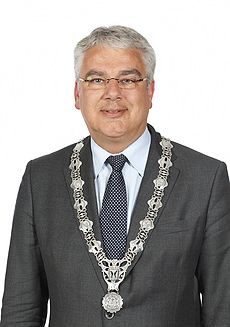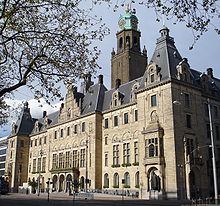- College van burgemeester en wethouders
-
The college van burgemeester en wethouders (abbreviated as college van B&W or simply B&W) is the executive board of a municipality in the Netherlands. This local government body plays a central role in municipal politics in the Netherlands. It consists of the mayor (burgemeester) and the members of the municipal executive (wethouders). Belgium has a similar system, which is referred to as the college van burgemeester en schepenen in the Dutch language.
Contents
Translation
College van burgemeester en wethouders is expressed in English in several ways, but "Mayor and Municipal Executive" or "Mayor and Executive Board" comes closest. The college van burgemeester en wethouders should not be confused with the town council itself (gemeenteraad).
A Dutch mayor (burgemeester) is sometimes called a "burgomaster" in English, but "mayor" is a more standard and conventional English translation.
A wethouder is a formal title in Dutch, but there is no real English equivalent. In English it is possible to address someone as "councillor" or "alderman", but this would refer more to someone sitting on the municipal council rather than the executive board. In the UK "alderman" is an honorary title. Sometimes wethouder is translated into English as "alderman", and indeed there is some similarity between the office of wethouder and the office of alderman as it used to exist in the UK before 1974; however, the term "alderman" is no longer used in many English-speaking countries (including the UK, Ireland, Canada and Australia), where it is mostly been replaced by other terms. Even in the US, where the term alderman is still actively used, "alderman" often refers to someone sitting on the municipal council rather than someone sitting on the executive board. Alderman is now seen by many as an inappropriate title for a woman, and for that reason alone does not really serve as an appropriate translation for the gender-neutral term wethouder. "Municipal executive councillor" or "municipal executive board member" serve as better translations for wethouder.
Composition and appointment
The mayor (burgemeester) of a municipality is ex officio the chair of the municipality's executive board. He or she has the casting vote in the event of a tie. Apart from this, however, the mayor is at the same level as the other members of the executive board.
The municipal secretary (gemeentesecretaris), who is chosen by the executive board, is responsible for the day-to-day operation of the executive board and assists with administrative and support matters.
After every municipal election, the wethouders are elected to the executive by the members of the municipal council. Wethouders hold office at the pleasure of the city council. The city council can remove someone from the office by way of a non-confidence motion.
Usually the municipal council elects sitting members of the council to the executive board, but it is also possible for them to elect someone from outside the council. A member of the municipal executive is not entitled to vote in municipal council resolutions, even if he or she was originally elected to the municipal council.
According to the Municipality Act (Gemeentewet), the number of wethouders cannot exceed 20% of the number of members of the municipal council (rounded up), but there must be at least two. In Dutch municipalities with 18,000 inhabitants or less, the office of wethouder is a part-time one. In larger municipalities the office is a full-time position, but the municipal council can choose to designate one or more wethouder positions as part-time positions, in which case the number of wethouders can go up to 25% of the number of municipal council members.
Duties
The executive roughly plays the same role in municipal government that a cabinet plays in national government. The wethouders are assigned portfolios within the municipal government and, in this capacity, prepare, coordinate, and plan policy and legislation for the council as a whole. They are also charged with the day-to-day government of the municipality and the implementation of legislation. The wethouders report to the municipal council on all aspects of what is happening within their portfolios. The college van burgemeester en wethouders functions as a committee that reaches decisions by way of consensus.
Party politics
Political parties play an active role in municipal politics in the Netherlands. Most candidates who run for municipal office are affiliated with a political party. The elected members of a municipal council are usually members of various political parties. The party with the most members on the council is seen as being in control of the town government. Quite often there is no single dominant party, so coalitions are formed. Since the council members vote for the members of the municipal executive, the municipal executive is also chosen along party lines. When it comes to this aspect of local government, there are two types of municipal executive. One type is called a "programme-based executive" (programmacollege); the other a "mirror executive" (afspiegelingscollege). Most executive boards in the Netherlands are programme-based.
A programme-based executive board is elected on the basis of a clear political programme by a majority vote of all the members of the municipal council. Thus, if the majority of members of the municipal council are members of a given party, it is likely that all members on the executive will be from that party or support that party and the board will have no difficulty implementing the party's programme. However, since the rise of "cohabitation" in Dutch municipal politics, and given the multi-party nature of Dutch politics, most executive boards have consisted of members from various parties, despite being programme-based.
A "mirror" executive board is one in which the make-up of the municipal executive reflects the distribution of the major parties in the municipal council. For example, if the members of the municipal council are evenly split between three mainstream parties, the members of the executive board will also be evenly split between these three parties.
Issues
Municipal councillors sometimes form party-based coalitions and vote in blocks to prevent members of opposing political parties from sitting on the executive board. So a party that does well in municipal election might be shut out of the municipal executive. For example, from 2002 to 2006, the municipal executive of Rotterdam consisted of municipal councillors from parties from the right of the spectrum (CDA, VVD and Leefbaar Rotterdam, the last of these being the most to the right). A mainstream party on the left, PvdA, had the second largest number of members on the Rotterdam municipal council, but they were kept out of the executive because of ideological conflicts with Leefbaar Rotterdam. The same happened in Groningen, but in reverse. Left-leaning parties elected in 2006 (PvdA, SP and the Groenlinks) kept members of parties on the right out of the executive, despite a strong performance in the polls.
Water boards Municipal Submunicipal Submunicipalities of Amsterdam · Submunicipalities of Rotterdamspecial municipalities Island council · Governing council · Lieutenant governorCategories:- Dutch words and phrases
- Government of the Netherlands
Wikimedia Foundation. 2010.


